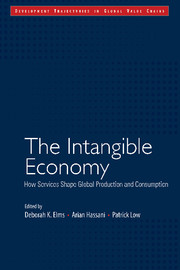Book contents
- Frontmatter
- Contents
- List of Figures, Tables and Boxes
- Acknowledgements
- 1 Introduction
- 2 Contextualizing Services in the World Economy
- 3 Services and Development: Priorities for Reform
- 4 Gainfully Linking into Global Value Chains: A Middle-Income Country's Perspective
- 5 Who Governs Global Value Chains?
- 6 Supply Chain Finance
- 7 Services and Economic Integration in ASEAN
- 8 Indian IT Firms: The Push for Innovation
- 9 Leveraging Business Process Outsourcing for Growth
- 10 Services in Global Value Chains and the Impact of Policy
- Contributors
- Index
- Development Trajectories in Global Value Chains
7 - Services and Economic Integration in ASEAN
Published online by Cambridge University Press: 19 October 2018
- Frontmatter
- Contents
- List of Figures, Tables and Boxes
- Acknowledgements
- 1 Introduction
- 2 Contextualizing Services in the World Economy
- 3 Services and Development: Priorities for Reform
- 4 Gainfully Linking into Global Value Chains: A Middle-Income Country's Perspective
- 5 Who Governs Global Value Chains?
- 6 Supply Chain Finance
- 7 Services and Economic Integration in ASEAN
- 8 Indian IT Firms: The Push for Innovation
- 9 Leveraging Business Process Outsourcing for Growth
- 10 Services in Global Value Chains and the Impact of Policy
- Contributors
- Index
- Development Trajectories in Global Value Chains
Summary
Introduction
Comprising 10 member states, the Association of Southeast Asian Nations (ASEAN) represents a dynamic region that is well integrated into GVCs, putting it squarely on the radar of many potential investors. Over the years, trade and investment flows in the region, including those that are intra-regional in nature, have continued to increase with the proliferation of GVCs.
Along with this phenomenon, there is growing recognition of the significant and potential role of services in the region's economies, not only in terms of their contribution to production, income and employment, but also as an enabler and driver of GVC participation and a new source of value and innovation (Low, 2013). There is also broad acknowledgement of the under-estimation and under-appreciation of services in trade data as conventionally measured, and the difficulty in measuring services activities to accurately assess their contribution.
The significant role of services is reflected in their growing contribution to the region's economy, as well as the intensification of trade, albeit from a low base. Services have also accounted for the largest share of direct investment inflows to the region in recent years. As a number of the region's economies seek to overcome the middle income trap and move up GVCs, others are seeking entry points into GVCs. In both these cases, services are likely to feature more prominently in national agendas.
Services have also been an important element of the region's economic integration agenda since the beginning. The region's goal to establish an ASEAN Economic Community (AEC) by 2015-end will necessarily entail the integration of the services market. The AEC has four broad objectives, also called ‘pillars’. Free flow of services is a key element of the first AEC pillar, which is the establishment of a single market and production base. As the region's economies further develop, demand for high-value-added services – both as inputs to production and for direct consumption – will continue to increase, as will the need for the requisite skills and market environment to supply such services. Going forward, the challenge is to advance the region's understanding of and strategy on services, not only in the narrow terms of services integration, but also as an integral part of the region's development agenda.
- Type
- Chapter
- Information
- The Intangible EconomyHow Services Shape Global Production and Consumption, pp. 113 - 131Publisher: Cambridge University PressPrint publication year: 2017

